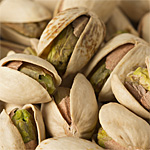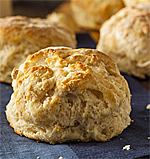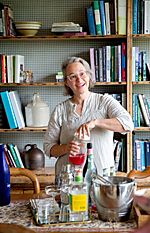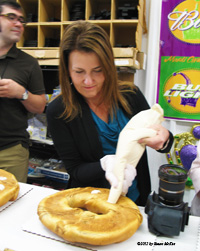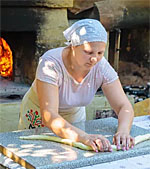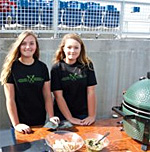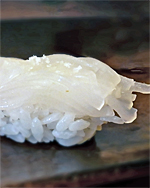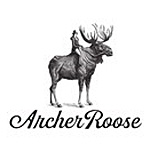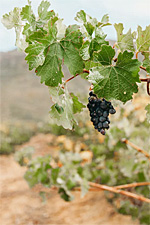Where to Eat: Macau
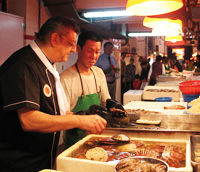 By Susan McKee
By Susan McKee
The Road Trips Foodie
Counterpoint between Portuguese and Chinese culture is a fact of daily life in Macau. Once a Portuguese territory and now a Special Administrative Region of the People’s Republic of China, Macau is a unique mix of Asia and Europe.
Food is an obvious place to look for the interplay between the cultures. On a trip to Asia, your Road Trips Foodie was lucky enough to be asked to accompany one of Macau’s noted chefs on his trip to the market – something he does every day to buy what he’ll prepare in his restaurant that evening.
Although Macau’s population is 95% Chinese and only 5% of Portuguese or mixed Chinese-Portuguese ancestry, both Portuguese and Cantonese Chinese are official languages. This fact is on display during our jaunt. At each of his stops in the Red Market (also known as the Mercado Almirante Lacerda), António Coelho (pictured) spoke in Portuguese to the ethnic Chinese vendors, all of whom evidently know him well.
The floors give evidence of why it’s known as a “wet market”. The tiled floors are hosed down frequently – necessary in a place where meat, poultry and fish are sold (and often butchered as well). The tiled floors of the red brick market built in 1936 are definitely wet and a bit slippery as we enter.
Coelho, who came to Macau after a divorce, is a heavily-built guy in his 50s who makes frequent pauses for cigarette breaks (smoking is still de rigueur in China). A native of Portugal who’s worked in Europe, Africa and now Asia, Coelho is a Master Chef of the Chaine des Rotissuer and member of the Portuguese Manager’s Association in Macau.
We go from vendor to vendor, checking out shellfish here, vegetables there and even selecting flowers for the tables of his eponymous restaurant: António, No.3 Rua dos Negociantes, Taipa, Macau.
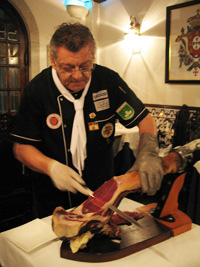 Located in the old town area of Taipa (once famous for its firework factories), the restaurant is a glimpse of Portugal with its white and blue tiled walls. Bottles of port (what else?) line shelves along the wall behind the bar. His signature dishes include lobster cocktail, goat cheese with acacia honey and Portuguese olive oil and Portuguese duck rice. Yes, his sausages, cheeses, olive oils and sardines come from Portugal, even as the fish and lobster are sourced at the Red Market. Needless to say, the dinner that evening (with António in the kitchen) was divine.
Located in the old town area of Taipa (once famous for its firework factories), the restaurant is a glimpse of Portugal with its white and blue tiled walls. Bottles of port (what else?) line shelves along the wall behind the bar. His signature dishes include lobster cocktail, goat cheese with acacia honey and Portuguese olive oil and Portuguese duck rice. Yes, his sausages, cheeses, olive oils and sardines come from Portugal, even as the fish and lobster are sourced at the Red Market. Needless to say, the dinner that evening (with António in the kitchen) was divine.
I sampled traditional Portuguese cuisine at the historic Military Club during Sunday brunch. The pink and white Portuguese colonial building, dating to the 1870s, reeks of days gone by. My favorite was the Cozido a Portuguesa, combining all sorts of sausages, meats and chicken.
Keeping with the Iberian cuisine theme, I enjoyed a Spanish-style lunch at Pousada De São Tiago, a five-star inn at the tip of a peninsula into Praia Grande Bay. Originally a Portuguese fortress used to protect the enclave from pirates and other invaders, it’s now a small hotel and a restaurant (and, part of Relais & Châteaux). A popular site for weddings, it includes the Chapel of St. James, built in 1740.
Don’t confuse Macau with Hong Kong. Yes, they’re both European enclaves just a ferry ride apart on the edge of China. Yes, they’re both SARs – Special Administrative Regions – of the People’s Republic of China, which gives them a “special” set of laws and regulations and a high degree of autonomy.
But, beyond those similarities, they’re more different than alike. The much larger Hong Kong was governed as a British colony from the 1840s until 1990. Macau, although it was administered by Portugal for 442 years, never was a colony. It was the last European territory in continental Asia, becoming a Chinese SAR in 1999.
The major difference to American tourists between the SARs and the mainland: there are no visa requirements for either Macau or Hong Kong, so it’s much easier to visit.
(Photos by Susan McKee)


